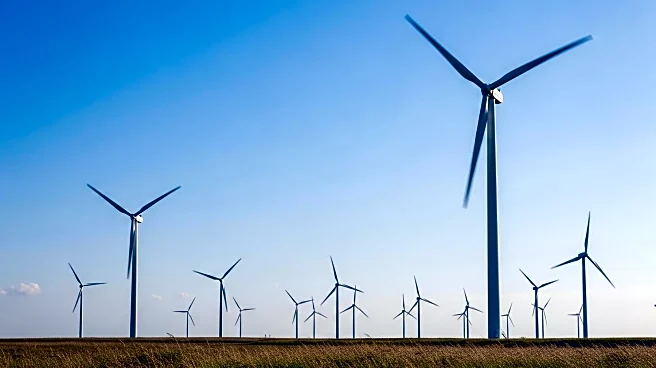What's Happening?
Windergy India 2025, an international trade fair and conference on wind power, is set to focus on expanding India's domestic wind energy manufacturing and R&D capabilities. Scheduled for October 29-30 in Chennai, the event will feature participation from over 20 countries and more than 350 exhibitors. The conference aims to reinforce India's leadership in wind energy, with discussions on achieving 100 gigawatt (GW) of wind power capacity by 2030. The event is supported by the Ministry of Power, the Ministry of New and Renewable Energy, and other industry bodies. India currently ranks fourth globally in wind energy installations, with a capacity of 52,681.2 megawatts as of August 2025.
Why It's Important?
The focus on self-reliance in the wind energy sector is crucial for India's renewable energy ambitions. By enhancing local manufacturing and innovation, India aims to reduce dependency on imports and strengthen its position in the global renewable energy market. The event highlights India's commitment to clean energy and its strategic partnerships, which are essential for achieving energy self-sufficiency. The wind sector contributes significantly to India's renewable energy capacity, and increased localization of turbine components is expected to rise to 85% by 2027, furthering the nation's Aatmanirbhar vision.
What's Next?
Windergy India 2025 will serve as a platform for innovation, investment, and collaboration in the wind energy sector. The event will spotlight emerging technologies and foster strategic alliances across borders. As India scales its renewable energy ambitions, the conference will explore pathways to achieving the 100 GW wind power capacity target by 2030. The discussions and partnerships formed at the event are expected to drive further growth and localization in the sector, reinforcing India's leadership in renewable energy.
Beyond the Headlines
The emphasis on self-reliance in wind energy reflects broader trends in India's economic policy, focusing on indigenous innovation and manufacturing. This approach not only supports environmental goals but also aligns with national economic strategies to boost local industries and create jobs. The event underscores the importance of policy support and strategic industry partnerships in achieving these objectives, highlighting the interconnectedness of energy, economy, and national security.









